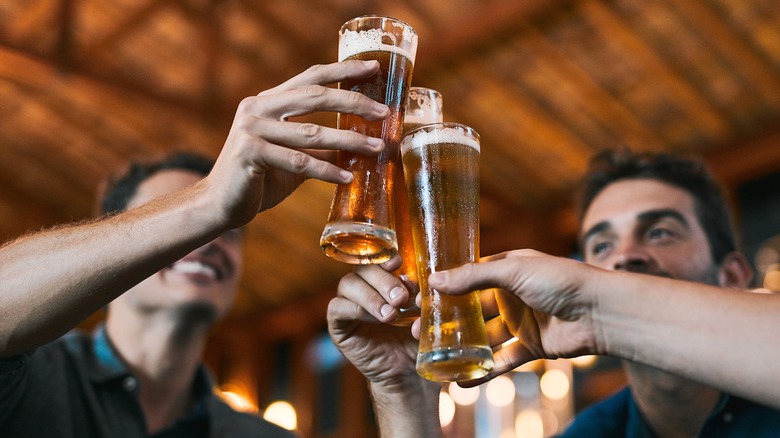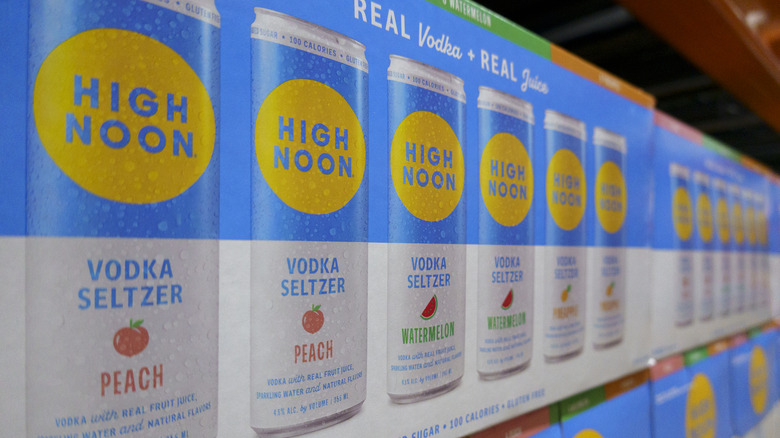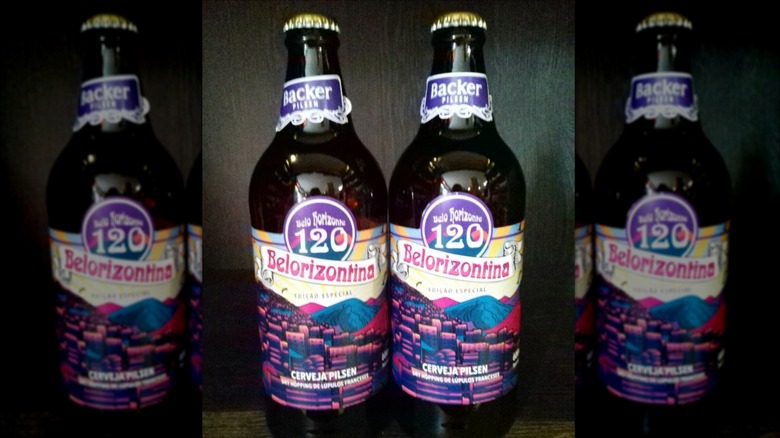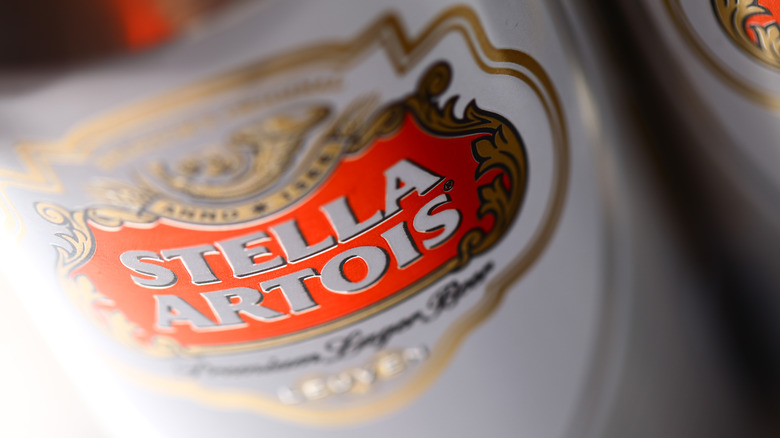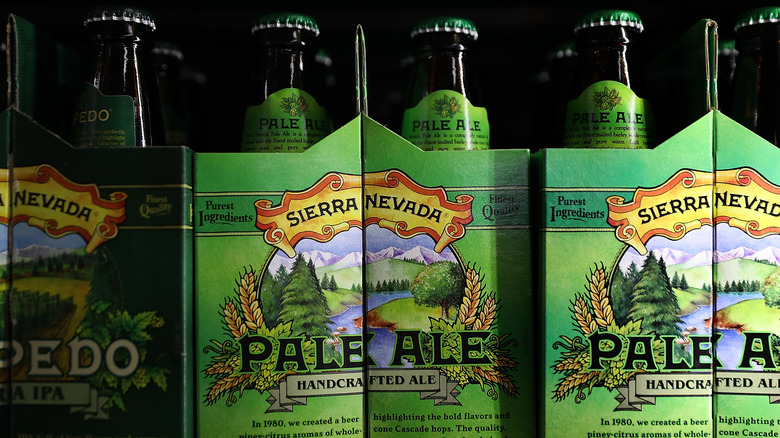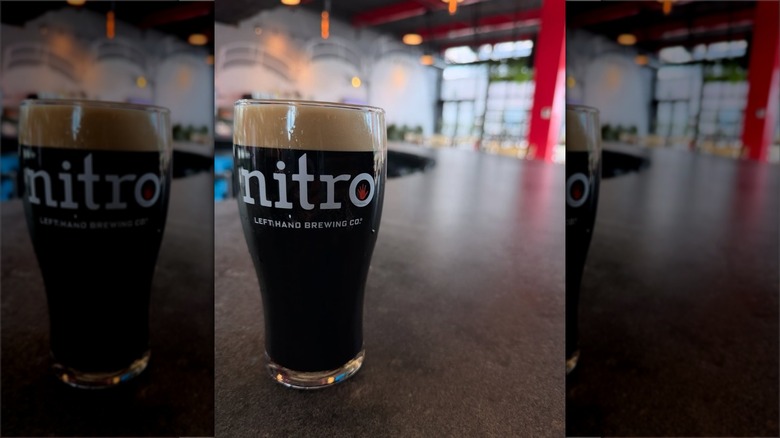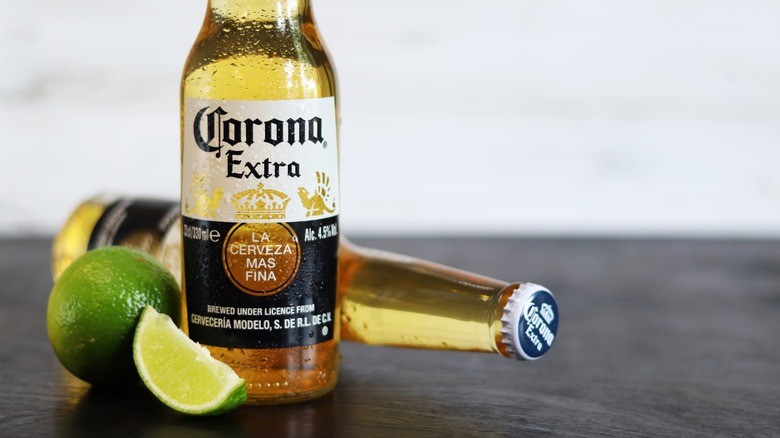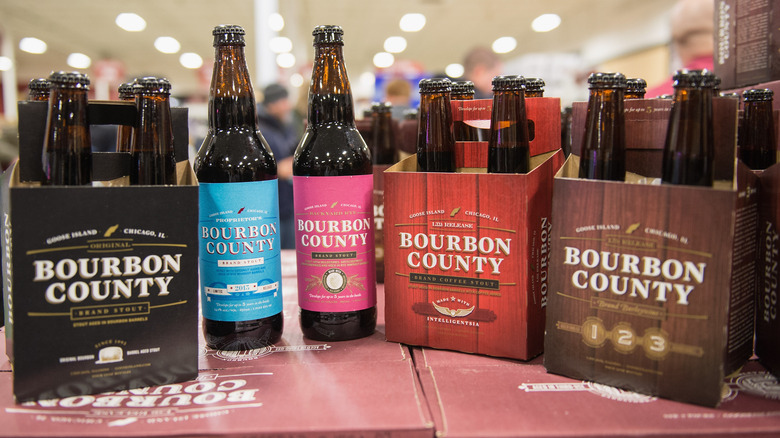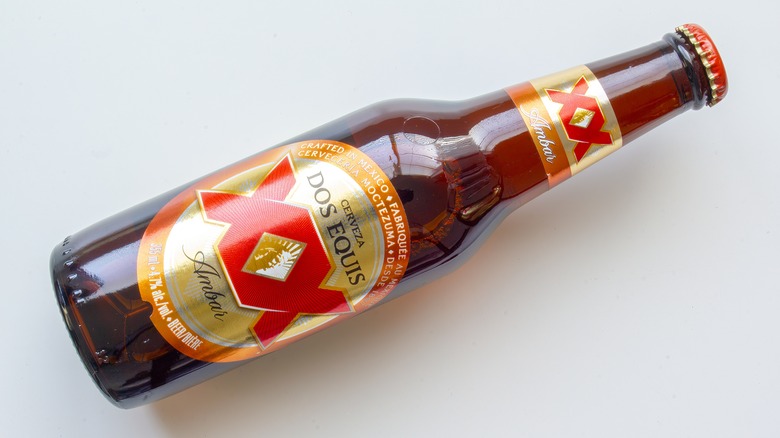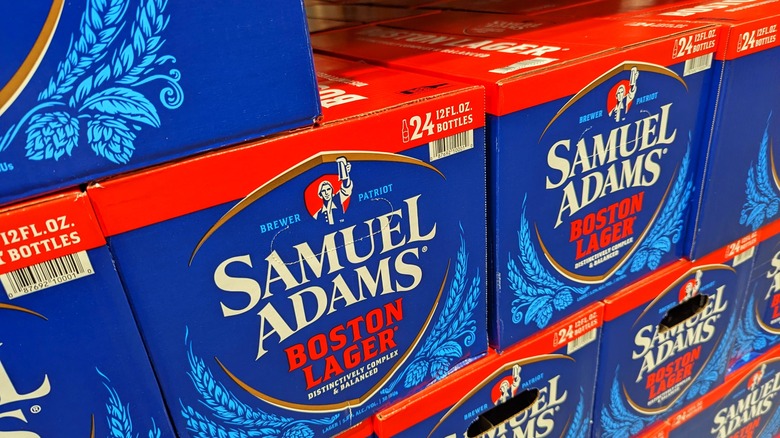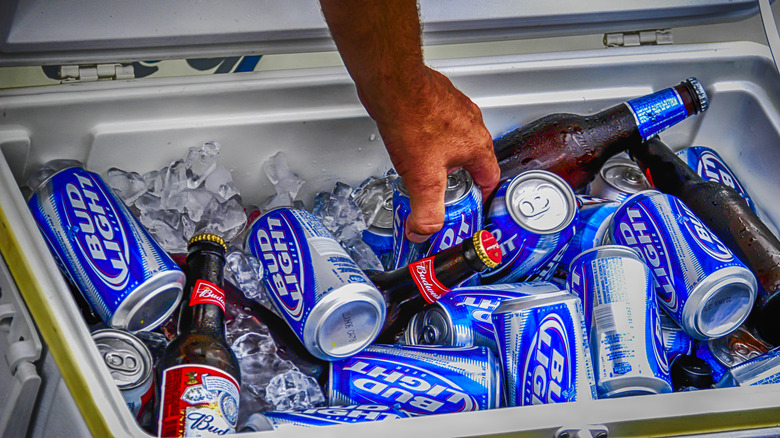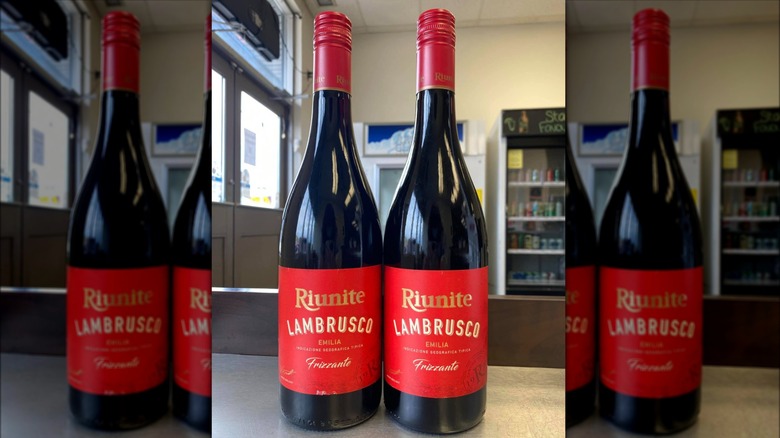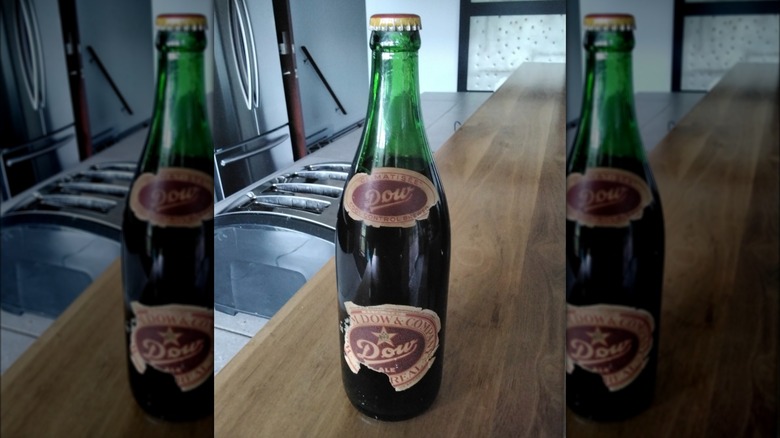12 Alcohol Recalls That Affected Millions
Alcohol is often seen as a treat — a pleasant indulgence to unwind at the end of the day or enjoy during a night out with friends. The last thing tipplers anticipate is that their favorite bottle could pose a health risk. In reality, there is a lot that can go wrong during the alcohol manufacturing process. Equipment malfunctions, contamination, or simply human error can all affect the integrity of the final product. Whether it's glass fragments in bottles or unexpected toxins, even the biggest brands haven't proven immune to safety scandals.
Of course, alcohol isn't the only beverage to have been hit by safety scandals. A long list of soda recalls has also affected customers in the past. However, the list of alcohol recalls is surprisingly long, highlighting the importance of strict production oversight. After all, just one mistake can undermine customer trust, leading to costly recalls and even the downfall of an entire brand. From wine giants to local breweries, here is a roundup of some of the most significant alcohol recalls in history.
High Noon recalls High Noon Beach Variety packs due to mislabeling (2025)
Consumers who tried Celsius Astro Vibe Energy Drink, Sparkling Blue Razz Edition, in 2025 could have gotten more than they bargained for. This is because some of the Celsius Astro Vibe cans contained an entirely different beverage — namely, High Noon Vodka Seltzer. This meant that unsuspecting buyers were drinking alcohol instead of an energy drink. The only way to recognize the affected cans was by looking at their lids, which were silver rather than the usual black. The affected cans were sold in High Noon Beach Variety packs.
High Noon announced the recall after discovering that its packaging supplier had accidentally sent the company empty Celsius Astro Vibe cans, which were then filled with the alcoholic beverage. The contaminated cans were sold in six states: Florida, New York, Ohio, South Carolina, Virginia, and Wisconsin. No adverse health issues were associated with the beverage at the time of the recall. In an attempt to distance itself from the fiasco, Celsius Holdings — the name behind Celsius Astro Vibe Energy Drink — issued a statement saying that it had no role in the manufacturing, filling, or distribution of the recalled cans.
Cervejaria Backer recalls beer after 10 consumers die from diethylene glycol poisoning (2020)
Used in the likes of antifreeze, paint, and brake fluids, diethylene glycol has no place in beer. Sadly, in 2020, the chemical was found in some Cervejaria Backer Belorizontina beer after consumers started falling seriously ill. Diethylene glycol, which was used in the beer's cooling process, was reported to have accidentally leaked into the beverage. The contaminated beer was linked to at least 10 deaths and left at least 14 people with after effects such as facial paralysis and blindness.
The National Secretariat for Consumer Protection accused Cervejaria Backer of failing to carry out the recall in a way "that would guide customers to stop buying and ingesting their products" (via Inside Beer). As a result, the Ministry of Justice fined the company R$12 million ($2.34 million). The brewery, which closed for several months in January 2020, resumed production after replacing diethylene glycol with hydroalcoholic solution, a coolant made up of alcohol and water. In 2023, Cervejaria Três Lobos agreed to pay R$500,000 ($105,000) to each victim of the tragedy and R$150,000 ($31,500) to each eligible family member.
AB InBev recalls Stella Artois due to contamination with glass fragments (2018)
Part of the AB InBev empire, Stella Artois is one of the top-selling beer brands in the U.S. The beer was first introduced in Leuven, Belgium, in 1926 as a Christmas special, eventually joining the lineup of the brewery's year-round offerings. Nearly a century later, the company recalled its famous lager in both the U.S. and Canada due to possible contamination with particles of glass.
The 11.2-ounce bottles were recalled in 2018 when AB InBev identified a packaging flaw from one of its bottlers that posed the danger of the glass chipping off into the bottled product. While the recall involved fewer than 1% of Stella Artois bottles sold in the U.S. and Canada, that percentage was still pretty substantial considering the beer's popularity. The recall affected Stella Artois six-packs, 12-packs, 18-packs, 24-packs, and the "Best of Belgium" multipacks distributed across the U.S. and Canada, along with Stella Artois Légère six-packs and 12-packs in the U.S.
Sierra Nevada recalls select beers due to packaging flaw (2017)
Founded in 1980 in Chico, California, by Ken Grossman, Sierra Nevada grew out of a homebrewing hobby and a brewhouse built from repurposed dairy equipment. The five barrels of stout produced that year laid the foundation for Sierra Nevada's success, with the brewery eventually becoming one of the top craft breweries in the U.S. Notably, Sierra Nevada is also recognized for setting a Guinness World Record for launching a 120-pound keg 438 feet with a giant catapult. But Sierra Nevada's growth wasn't without hurdles.
In 2017, the company learned firsthand that higher outputs can bring new challenges, recalling several beer lines after a troubling inspection at its Mills River, North Carolina, facility. More specifically, the quality control check revealed several bottles with a defect that could potentially lead to glass particles breaking away and contaminating the beverage. The recalled brands included Sierra Nevada Pale Ale, Beer Camp Golden IPA, Sidecar Orange Pale Ale, Torpedo Extra IPA, Tropical Torpedo, Nooner, Hop Hunter, and Otra Vez. The beers were distributed in 35 states, plus Washington, D.C.
Left Hand Brewing recalls beer over yeast contamination (2016)
Left Hand Brewing is known for its Milk Stout Nitro, a smooth and creamy brew that uses nitrogen instead of standard carbonation to create bubbles — a method pioneered by Guinness. Unfortunately, in 2016, the brewery was forced to recall over 20,000 cases of its Milk Stout Nitro after foreign yeast caused secondary fermentation in the bottles. Although the beer remained safe for consumption, the contamination led to excessive carbonation that caused it to foam more than usual.
Approximately a year after announcing the recall, Left Hand Brewing sued its yeast supplier, White Labs, claiming that the yeast it had purchased contaminated $2 million of beer. The brewing company also alleged that the fiasco led to a significant decrease in sales. White Labs denied responsibility, citing a lack of proof that it was their yeast that led to the spoilage, arguing that it always conducts thorough testing.
Constellation Brands recalls Corona over fears of glass contamination (2016)
With beginnings dating back to 1945, Constellation Brands has grown from a small wine company into a leading global producer of beer, wine, and spirits. One of the most popular beers in the company's portfolio is Corona. In 2016, Constellation Brands became embroiled in controversy after it pulled 12-pack and 18-pack cases of Corona from the shelves over fears of glass fragments in the bottles.
The action was initiated after routine inspections of two AB InBev breweries, which were handling production for Constellation Brands. The beer was distributed throughout the U.S. and Guam. Luckily, no injuries were linked to the product at the time of the recall.
The 2016 recall wasn't the first time that Corona was thrust into the spotlight due to quality concerns. In 2014, Constellation Brands carried out a similar recall of Corona over fears that some bottles contained shards of glass. The affected batches were only sold in Guam, and the bottles in question originated from one of the four third-party plants that supplied bottles to the company.
Goose Island Beer Company recalls Bourbon County Stout after bacterial contamination (2015)
Goose Island Beer Company started out as a brewpub in Chicago in 1988. The operation grew from strength to strength, with the company launching its Bourbon County Stout in 1992 to celebrate brewing 1,000 batches of beer. Today, Goose Island's Bourbon County Stout is one of the most coveted in the business. However, the road to success is rarely smooth, even for such a beloved brew.
In 2015, Goose Island Beer Company came under the microscope after initiating a voluntary refund program for its Bourbon County Stout infected by Lactobacillus acetotolerans bacteria. The pathogen led to off-flavors, giving the stouts a sour taste. This initially only affected Goose Island Bourbon County Coffee Stout and Bourbon County Barleywine, but was later expanded to also encompass other batches of Bourbon County Stout.
While the bacteria affected the taste of the beer, they didn't present any threat to human health at the concentration detected in the beer. It's believed that the source of the contamination was the tanks used to transfer the stout from the company's facility for barrel aging beer to its bottling plant.
Heineken USA recalls beer due to possible glass contamination (2012)
Heineken's story began over 150 years ago, when 22‑year‑old Gerard Adriaan Heineken bought his first brewery. Today, Heineken is world famous for its lineup of over 300 beers and ciders, such as the Netherlands' Amstel, Singapore's Tiger Beer, and Italy's Birra Moretti. Despite its proud brewing heritage, Heineken found itself in a spot of bother in 2012 when it recalled several beers from its Mexican brands due to potential contamination with pieces of glass.
The recalled brews included Carta Blanca, Dos Equis Ambar, as well as its Best of Mexico and Beers of Mexico variety packs that contained the affected beers. The contaminated beer, which was distributed in the U.S., was packaged in bottles sourced from a third-party supplier, which proved to be defective. The flaw created a risk that small glass fragments might break away from the lip of the bottle and end up in the drinks themselves. While no injuries were reported at the time of the recall, Heineken USA recalled the products as a precautionary measure.
The Boston Beer Company recalls Samuel Adams Beer due to defective bottles (2008)
The Boston Beer Company was one of the pioneers of the craft beer movement in the U.S. Founded in 1984 by Jim Koch, the company started out distributing its first brew to bars and restaurants around Boston. Its best-known brand, Samuel Adams, produces a variety of beers. However, its flagship product, Samuel Adams Boston Lager, uses a recipe tracing back to the late 19th century, created by Jim Koch's great‑great‑grandfather, who was a brewer in St Louis, Missouri.
In 2008, the Boston Beer Company issued a voluntary recall of its Samuel Adams beer. The reason? A routine inspection of the company's Cincinnati brewery revealed a flaw in the Samuel Adams beer bottles, which had been produced by a third-party supplier. It was feared that the defect could result in tiny shards of glass breaking loose and falling into the bottles. Since no injuries were reported at the time of the recall, the move to pull the beer from the market was entirely precautionary.
AB InBev recalls Bud Light due to contamination with cleaning solution (1995)
It's safe to say that no one buying beer anticipates that it might actually contain cleaning solution or any other toxin. Unfortunately, this is precisely what happened in 1995 when AB InBev pulled Bud Light from the market. The alert was raised after a consumer, Ronaldo Dela Cruz Ciriaco, vomited blood after drinking the brew at a bar in Glendale, California.
The company recalled more than 10,000 longneck bottles of Bud Light that were manufactured at its Van Nuys brewing plant on November 1. The company spokesman, Steve LeResche, shed light on the situation at the time, telling the Los Angeles Times, "We have found nothing that indicates this was anything but an isolated incident. ... What [Ciriaco] consumed was not beer. There was not Bud Lite in that bottle — it was a milky, cloudy fluid, which we think was cleaning solution."
But after investigating the incident, AB InBev admitted that the contamination originated at their brewery due to a "combination of rare circumstances" (via Los Angeles Times). More specifically, the company explained that the problem started when a wad of paper, which was lodged in a returned bottle, trapped the cleaning fluid inside the bottle. To make matters worse, the plant's electronic bottle inspection equipment also malfunctioned, allowing the contaminated bottle to bypass its safety protocols.
Riunite recalls batches of wine due to contamination with diethylene glycol (1985)
Riunite traces its beginnings to the 1950s when nine wine producers in Emilia-Romagna, a region in Italy, formed the Cantina Cooperative Riunite. Today, the cooperative is still in the hands of nearly 1,500 families of vine growers. In the U.S., Riunite is best known for its Lambrusco — a refreshing and fizzy wine, which Riunite claims is America's top-selling Italian wine.
Despite its popularity, Riunite faced a major setback in 1985 when the company recalled several of its wines because they were contaminated with diethylene glycol. Luckily, the amounts of the toxin in the wines were minuscule. The Bureau of Alcohol, Tobacco and Firearms (today known as the Bureau of Alcohol, Tobacco, Firearms and Explosives) estimated them at between seven and 10 parts per million. To put things into perspective, at the time, Europe allowed up to 10 parts per million of diethylene glycol in wine.
In the U.S., however, consumer safety laws prohibited even the tiniest amounts of the substance. Riunite recalled more than 400,000 cases of wine in the U.S. As if that number wasn't staggering enough, later reports suggest that this recall was ultimately expanded to more than 1.2 million cases, including Riunite Lambrusco and Riunite Spumante. Since diethylene glycol is often used in winery refrigeration systems, officials at the time speculated that the wine could have been contaminated due to a small leak in the equipment.
Dow Breweries beer leads to multiple deaths due to contamination with cobalt sulfate (1965)
In its heyday, Dow Breweries was a big name on the beer scene in Quebec, Canada, but its reputation took a heavy hit after the 1965 cobalt sulfate incident. It all started after doctors in Quebec City noticed an unusual wave of cardiomyopathy among heavy beer drinkers between their 40s and 60s. After around 50 people presented with the same symptoms and 20 fatalities, doctors discovered a common denominator — drinking Dow beer.
Although a definitive link between Dow beer and the illnesses was never proven, evidence pointed strongly to cobalt sulfate used in Dow's brewing process. It didn't help that Dow only started adding cobalt sulfate to improve the foam stability of its beer in July 1965, around the time the epidemic began. Following the fiasco, Dow temporarily suspended its operations and discarded its remaining stock of beer into the Saint Lawrence River. While the brewery reopened, the Dow Breweries brand was discontinued in the 1990s after its owner merged with Molson Breweries.
